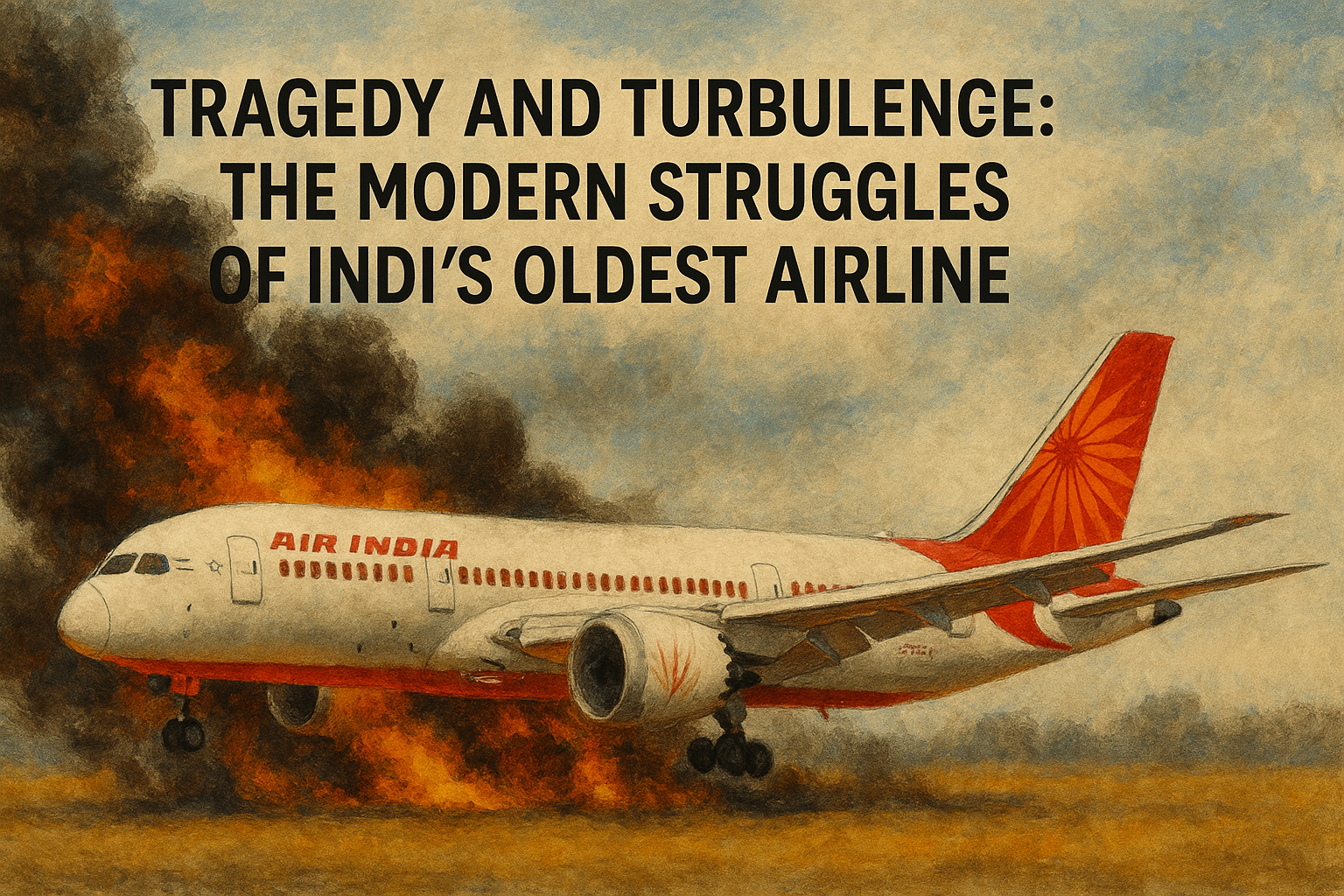A Fateful Thursday: Catastrophe in the Skies
India awoke to shock and sorrow on Thursday as one of its most iconic airlines—Air India—suffered a devastating tragedy. A London-bound Boeing jet crashed shortly after takeoff from Ahmedabad, descending into a dense residential area and erupting in flames. Over 240 lives were lost in what is now considered one of the deadliest commercial aviation disasters of this century. While investigations are ongoing, initial focus centers on a potential loss of engine thrust. For Air India, this catastrophic event has plunged an already embattled carrier deeper into crisis.
Legacy in Turmoil: A Long Flight Through Adversity
Air India, once a crown jewel of Indian aviation, has battled turbulence long before the flames of Thursday’s crash. Founded in 1932 by the Tata family during the colonial era, the airline was nationalized in 1953, subsequently enduring decades of underinvestment and bureaucratic inefficiency. By the 2010s, it was hemorrhaging funds—costing the Indian government an unsustainable $3 million per day.
That narrative changed in 2021 when Tata Sons reacquired the airline, aiming to recapture its former glory. They installed Campbell Wilson, a seasoned executive from Singapore’s budget airline Scoot, as CEO and set ambitious goals amidst a fiercely competitive aviation landscape.
A Renaissance Grounded by Reality
The Tata group’s vision for Air India was bold and symbolically rooted. In 2023, the carrier placed a record-breaking order of 470 aircraft from Boeing and Airbus, and followed with an additional order of 100 the next year. These moves, alongside efforts to modernize its cabin experience and improve service quality, were part of a sweeping overhaul to regain national pride and global credibility.
Yet, despite these strides, passengers and experts alike have noted a disconnect between ambition and execution. Skytrax, a global airline rating firm, notes “mixed product standards” and highlights poor cabin maintenance. Mark Martin, an aviation consultant, described a recent flight where basic amenities failed. “It actually runs worse than it was being run by the government,” he remarked.
Safety vs. Service: A Nuanced Distinction
While the crash has raised painful questions, aviation experts caution against conflating customer service lapses with flight safety. Kishore Chinta, a veteran safety analyst, emphasized that Air India has historically maintained a strong record of hiring experienced pilots and adhering to safety standards. The Thursday crash, however, marks the first fatal incident involving a Boeing 787 Dreamliner—an aircraft considered to be among the most advanced of its generation.
The airline’s budget arm, Air India Express, has had a more checkered past, including a 2010 runway accident that killed 158. Nevertheless, the parent group’s fatal incident record had remained unblemished until now.
Aftermath and Atonement: Corporate Response
In response to the tragedy, Tata Sons has pledged substantial support—$115,000 to the families of each victim and full coverage of medical expenses for the injured. Natarajan Chandrasekaran, chairman of Tata Sons, expressed profound grief: “No words can adequately express the sorrow we feel.”
Still, questions linger. Will this tragedy undercut years of restructuring? Will it embolden rivals like Emirates and Qatar Airways, which have long lured Indian passengers with superior service and reliability?
The Road Ahead: Can Air India Rise Again?
The dream of restoring Air India to its golden-age prestige is far from over—but now weighed down by mourning, scrutiny, and an urgent need for clarity and reform. As investigators sift through the wreckage and policymakers evaluate safety protocols, one truth emerges unmistakably: India needs a national carrier it can trust, both in comfort and safety.
The Tata group’s vision remains unfinished, and Thursday’s tragedy may become the defining crucible of its journey—either a moment of reckoning or one of renewal. The nation watches, heavy-hearted yet hopeful, as its oldest airline confronts perhaps its most defining test yet.
Feel free to share your experiences and insights in the comments below. Let’s continue the conversation and grow together as a community of traders and analysts.
By sharing this experience and insights, I hope to contribute to the collective knowledge of our professional community, encouraging a culture of strategic thinking and informed decision-making.
As always, thorough research and risk management are crucial. The dynamic nature of financial markets demands vigilance, agility, and a deep understanding of the tools at your disposal. Here’s to profitable trading and navigating the election season with confidence!
Ready to stay ahead of market trends and make informed investment decisions? Follow our page for more insights and updates on the latest in the financial world!
For a free online stock market training by Yogeshwar Vashishtha (M.Tech IIT) this Saturday from 11 am – 1 pm, please sign up with https://pathfinderstrainings.in/training/freetrainings.aspx
Experience profits with my winning algo strategies – get a free one-month trial with ₹15 lakh capital! – https://terminal.algofinders.com/algo-terminal
Disclaimer
This article should not be interpreted as investment advice. For any investment decisions, consult a reputable financial advisor. The author and publisher are not responsible for any losses incurred by investors or traders based on the information provided.


